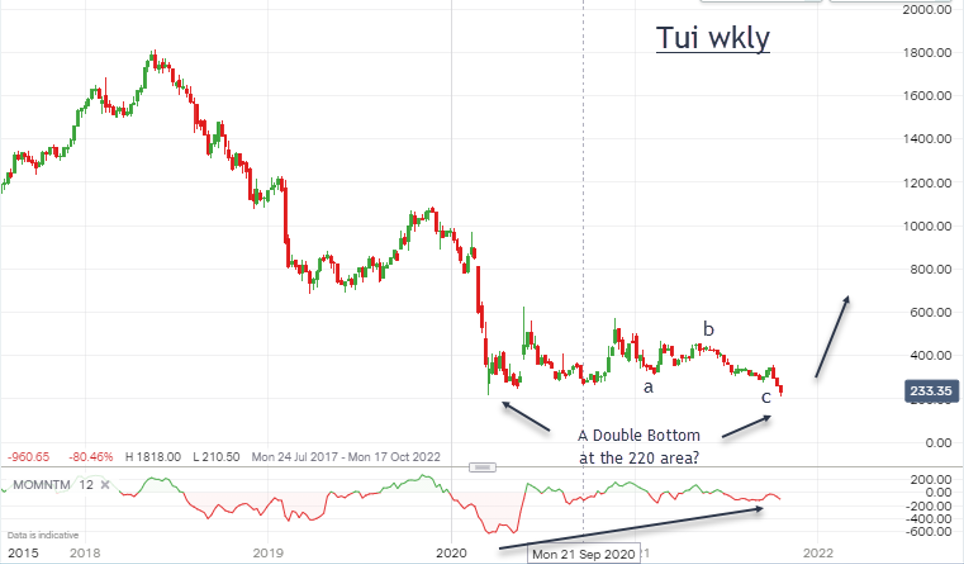Tui has been hit hard, but is it a great buy now?
25th October 2021 10:28
by John Burford from interactive investor
Charts analysts John Burford considers whether a major re-rating is around the corner for this holiday share.

Along with other tour and hotel operators, TUI (LSE:TUI) has been severely impacted by the pandemic lockdowns and extreme travel restrictions over the past 18 months. This German company boasted pre-pandemic turnover in 2018 financial year at 19 billion euros. Last year, company turnover was reported at a paltry 8 billion euros with a loss of 3 billion euros.
With that kind of performance, it is little wonder the shares have collapsed from their 2018 high at £18 to the recent £2 low. Ouch!
This summer, it appeared the worst of the effects of the restrictions were about over and with the vaccination roll-outs in full swing, holiday bookings could regain previous high levels and the shares rallied.
- Check out our award-winning stocks and shares ISA
- Airline stocks analysed: IAG, easyJet, Wizz Air
- The Chart Show: easyJet, ASOS and Rio Tinto
But in recent days, Covid cases in Europe have been climbing and there are worries that vaccination rates are lagging. Bullish travel sentiment has made a turn lower. And the winter low season is upon us. So, is this a good time to consider buying holiday shares?
Not on that picture, but have the shares fully discounted a worst possible scenario? Will next season also be a flop? If so, many travel companies will almost certainly go bust – an outcome unthinkable in the minds of governments who will be desperate to avoid mass layoffs. They will surely pull out all the stops to get vaccinated travellers on board.
In recent days, the shares have continued their decline, but do I see a buy low, sell high set-up here?

Past performance is not a guide to future performance
The slide off the 2018 high is spectacular and has the look of a large three down to the £2 region. But that price is precisely where the shares stood in March last year at the lows of the Corona Crash! That sets up the possibility we have a famous chart pattern: the Double Bottom.
Incidentally, this chart pattern of a 'real economy' company is in stark contrast to those of the tech giants that have done so well out of the pandemic and have lead the indexes into new highs. For instance, since 2018 Facebook (NASDAQ:FB) shares have more than doubled, while Tui shares have lost 88%. Is it possible perhaps a major re-rating is around the corner?
If so, then selling Facebook and buying Tui might pan out very well in the weeks ahead.
If we do have a Double Bottom here, then the huge momentum divergence would herald a major rally phase ahead – an exciting prospect as the many shorts would then be forced to cover (buy back) in the face of reduced earnings (and greater operating losses) in the coming winter season. A contrary result, indeed.
With a reversal, my first major target is the £5 area and then on to £6 with higher potential.
John Burford is the author of the definitive text on his trading method, Tramline Trading. He is also a freelance contributor and not a direct employee of interactive investor.
These articles are provided for information purposes only. Occasionally, an opinion about whether to buy or sell a specific investment may be provided by third parties. The content is not intended to be a personal recommendation to buy or sell any financial instrument or product, or to adopt any investment strategy as it is not provided based on an assessment of your investing knowledge and experience, your financial situation or your investment objectives. The value of your investments, and the income derived from them, may go down as well as up. You may not get back all the money that you invest. The investments referred to in this article may not be suitable for all investors, and if in doubt, an investor should seek advice from a qualified investment adviser.
Full performance can be found on the company or index summary page on the interactive investor website. Simply click on the company's or index name highlighted in the article.
Disclosure
We use a combination of fundamental and technical analysis in forming our view as to the valuation and prospects of an investment. Where relevant we have set out those particular matters we think are important in the above article, but further detail can be found here.
Please note that our article on this investment should not be considered to be a regular publication.
Details of all recommendations issued by ii during the previous 12-month period can be found here.
ii adheres to a strict code of conduct. Contributors may hold shares or have other interests in companies included in these portfolios, which could create a conflict of interests. Contributors intending to write about any financial instruments in which they have an interest are required to disclose such interest to ii and in the article itself. ii will at all times consider whether such interest impairs the objectivity of the recommendation.
In addition, individuals involved in the production of investment articles are subject to a personal account dealing restriction, which prevents them from placing a transaction in the specified instrument(s) for a period before and for five working days after such publication. This is to avoid personal interests conflicting with the interests of the recipients of those investment articles.